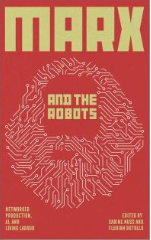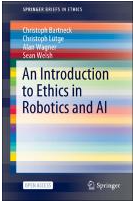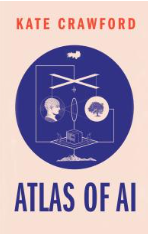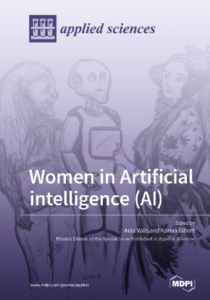Welcome to the fascinating world of artificial intelligence, where machines learn and the boundaries of intelligence are expanding at breakneck speed. Here I introduce five inspiring works that lead you deeper into the secrets of artificial intelligence. They will show you how artificial intelligence changes our world and how it challenges our traditional notions of intelligence. Whether you are a beginner or a seasoned expert, these works offer a fascinating journey into the shared future of technological development and human intelligence. (OpenAI, 2024)
The introductory text above as well as the article image were made with artificial intelligence tools (ChatGPT-3.5 & Krea.ai). The book introductions below are my own work.
For more information on the use of AI, see HAMK guidelines for artificial intelligence.
 Warwick, K. (2013). Artificial Intelligence: The Basics. Taylor & Francis Group.
Warwick, K. (2013). Artificial Intelligence: The Basics. Taylor & Francis Group.
If you knowledge of AI is based on what you read in the media, you might find this useful. Warwick’s book is a little old, but still a good introduction to the basics. He starts by asking what intelligence is, then moves on to classical and modern AI, covering topics like philosophy, robots, and sensing the world. The synopsis at the beginning of each chapter is helpful when pressed for time.
 Butollo, F., Sabine Nuss, Herrmann, J., & Nuss, S. (2022). Marx and the Robots: Networked Production, AI and Human Labour. Pluto Press.
Butollo, F., Sabine Nuss, Herrmann, J., & Nuss, S. (2022). Marx and the Robots: Networked Production, AI and Human Labour. Pluto Press.
Authors provide an interesting take on the effects of automation and digitalisation on human labour. The book has been divided into four major parts. The first focuses on automation as a concept, the second discusses the use of robots. Modern digital work and networked production are discussed next. The fourth and final part focuses on platform capitalism, where platform technology is the key. Well-known examples of platform capitalism are companies like Amazon and Facebook.
 Bartneck, Lütge, C., Wagner, A., & Welsh, S. (2021). Introduction to Ethics in Robotics and AI. Springer International Publishing.
Bartneck, Lütge, C., Wagner, A., & Welsh, S. (2021). Introduction to Ethics in Robotics and AI. Springer International Publishing.
This is a great little book on the ethics of AI. It has been directed for students, and covers all major topics from privacy issues to various application areas of AI, autonomous vehicles, robotics and even the military uses of AI. Practical examples both illustrate the issues and make for interesting reading.
 Crawford, K. (2021). Atlas of AI: Power, politics, and the planetary costs of artificial intelligence. Yale University Press.
Crawford, K. (2021). Atlas of AI: Power, politics, and the planetary costs of artificial intelligence. Yale University Press.
Crawford takes a planetary view on AI, arguing that the current power structures behind the development of AI are moving societies towards undemocratic governance and increased inequality. The development of AI costs us natural resources, human jobs, our privacy and personal data, and more. Its is important to be aware of the costs of AI, for our future is at stake.
 Valls, A. & Gibert, K. (2022). Women in Artificial intelligence (AI). MDPI – Multidisciplinary Digital Publishing Institute.
Valls, A. & Gibert, K. (2022). Women in Artificial intelligence (AI). MDPI – Multidisciplinary Digital Publishing Institute.
Despite the name, this edition does not concentrate on gender bias in artificial intelligence. Only three of the seventeen articles included discuss gender. The majority of the work concentrates on different aspects of AI, including machine learning, perception, and more. All the papers have a woman as the first author, and include contributions from all over the world.
Source:
OpenAI. (2024). ChatGPT-3.5 (Jan 17 version) [Large language model]. https://chat.openai.com/chat



